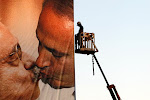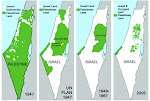
Hebron is a city like no other. It’s part ghost town, part bustling downtown, flanked by jittery no-go zones. Izzy Bee arrived on Tuesday and accompanied five bright teenagers on a late afternoon walk around the historic heart of their hometown. (Note- last spring I’d joined a coach load of rabbis from Russia and New Jersey for a Jewish perspective.)
Hebron feels menacing, and is wedged between Jewish settlements such as Kiryat Arba, which appear to be inhabited mostly by extremists with American accents. Many tote pistols and stoke a powerful mood of spite and paranoia. Ugly racist grafitti desecrates the Star of David on deserted streets where Muslim families have their front doors welded shut and must scuttle out their back entrances. Israeli soldiers are under orders to protect settlers and must prevent the local Palestinians from crossing their paths. Animosity festers here.
On the way to the holy sites-- Ibrahimi Mosque (Mosque of Abraham, adjacent to the Jewish Cave of the Patriarchs, venerated by both Jews and Muslims) -- we passed through an airport-style screening, and got delayed because an American with us had rivets on his Levis which kept setting off the alarm. By the time we got through the bars, it was dusk, the call to prayer had sounded, and three of us non-Muslims were not allowed inside. We were told politely by soldiers to come back in 30 minutes. Just to pass the time, without wasting time to renegotiate the security check, we all wandered down the road, where Jewish settlers were blasting some polka music over loudspeakers as a counterpoint to the prayers. Again, there was a military checkpoint, and all nine of our incongruous group were turned back. We chatted with a buff soldier from Tel Aviv, who appeared with a machine gun after a young Israeli guard summoned for help.
“I am a patriot and it’s my duty to serve my country,” he replied when asked why he was pulling a gun on unarmed kids his same age. This sandy-haired 19-year-old admitted that there is no hope inhabitants of Hebron would ever be able to live in harmony. “I am just being realistic,” he shrugged.
This was a dire prediction for a place where Arabs and Sephardic Jews coexisted in peace for centuries. Separate lifestyles were not put into place until the arrival of an Ashkenazi Yeshiva. The community diverged. A massacre in 1929, when 67 Jews were brutally killed during three days of violence, was a terrible turning point for all communities. Things fell apart. And a splattershoot in the Ibrahimi Mosque by a Brooklyn-born settler called Baruch Goldstein, who murdered 29 praying Muslims and wounded scores more, branded the violence into the international conscience.
After a half hour elapsed, our group mounted the steep stairs, only to be turned back by a guardian of the mosque, a power-crazed chap from the Ministry of Religion. He insisted that after sundown, non-Islamic visitors were unwelcome. Then he shoved the Muslim peace activist from Jenin, who had organized our trip. He started cursing and shouting at us outside this holy shrine, and whacked the peace activist on the shoulder. Soldiers came scrambling to break up the clash before it became a brawl.
 Another one came with a platter of doughnuts to distribute to the young draftees, this being Hanukkah. An old man in a woolen watch cap hustled over, ready to see some action. Nudged by the locals, we decided to quietly disperse, and even though I was tempted by the fresh pastries, managed to resist the urge to help myself to doughnuts and share them with the hungry Hebron boys beside me, and risk fueling more violence. The boys are used to such scuffles. One told me that the last time he was beat up on the way to school, the soldiers videoed it on their mobile phones for entertainment viewing while on guard duty.
Another one came with a platter of doughnuts to distribute to the young draftees, this being Hanukkah. An old man in a woolen watch cap hustled over, ready to see some action. Nudged by the locals, we decided to quietly disperse, and even though I was tempted by the fresh pastries, managed to resist the urge to help myself to doughnuts and share them with the hungry Hebron boys beside me, and risk fueling more violence. The boys are used to such scuffles. One told me that the last time he was beat up on the way to school, the soldiers videoed it on their mobile phones for entertainment viewing while on guard duty.
Israelity bites.
(top photo courtesy of Christian Peacemaker Teams)
 Was this contest rigged? Over at Checkpoint Jerusalem, they are posing that question after the nerdy little guy above was selected as the emblem of all Israelis and is set to appear on a postage stamp for the country's 60th anniversary. It doesn't merit everyone's stamp of approval, apparently.
Was this contest rigged? Over at Checkpoint Jerusalem, they are posing that question after the nerdy little guy above was selected as the emblem of all Israelis and is set to appear on a postage stamp for the country's 60th anniversary. It doesn't merit everyone's stamp of approval, apparently. 























